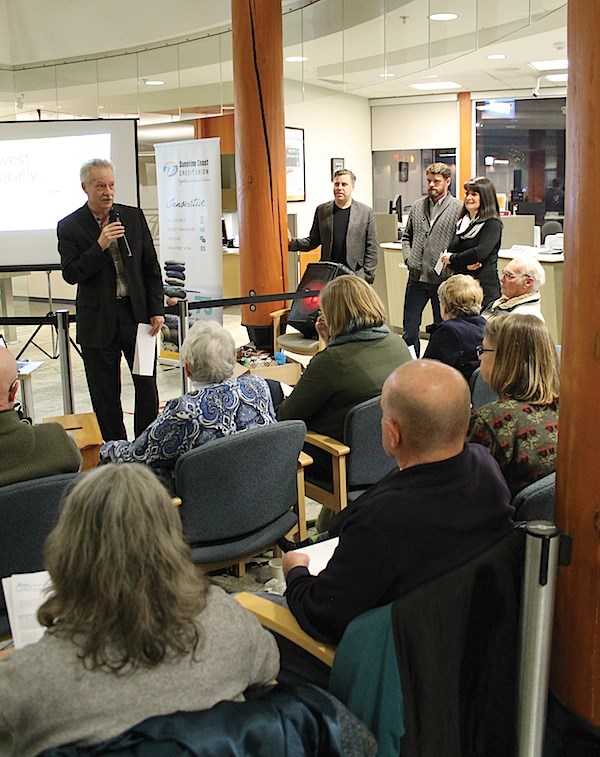The people behind the Coast Community Investment Co-op say they’re getting a lot of interest from potential investors who’d like to see their money support local enterprises.
More than 40 people came out to a Jan. 26 information session at the Sunshine Coast Credit Union in Sechelt, according to Lindsay Cole, the chair of the co-op board.
Rhiza Capital CEO Brian Smith will manage the co-op’s fund (for which Rhiza will collect one per cent of the funds under management as a fee).
“This was our third time doing [an information session],” Smith said. “Each time it seems like the group gets more and more engaged in the conversation.”
Smith added that the group at the Credit Union session already had a good grounding in how co-ops work, because a lot of them were Credit Union members, so many of the questions were around topics like the business model, possible rates of return and types of investments the co-op might make.
Cole said the co-op is being set up differently from programs like the Local Entrepreneur Accelerator Program (LEAP), the Com-munity Futures initiative to help get local start-ups off the ground. “The co-op is an investment vehicle; many other [programs] are donations. The co-op is actually a way for local people to invest local money with a modest return. That’s the main difference,” Cole said.
Smith explained the difference this way: “The co-op is about raising capital to invest in small businesses and community enterprises, whereas LEAP and the Barnraiser program are about building those social enterprises and community businesses.”
Cole said the co-op will be targeting its investments carefully. “Our priorities right now are affordable housing, projects related to food security on the Sunshine Coast – from growing food all the way to processing and distribution, ones that create meaningful employment – and business and organizations that are working on ecological response and resilience.”
They’re also looking for investments that make sound business sense, Smith said. “We want to make sure the businesses, the recipients of the investment capital, can pay it back, ideally with a little bit of a return, and are definitely solid business models and have revenue models that allow for the cash flow to make sure that it’s a financially viable investment.”
Smith said the co-op will aim for a one to three per cent annual return from its investments, as well as a “social” return.
“Part of their return is a social or ecological return on their investment, and we see that as valid,” Smith said. “It doesn’t reflect in dollars into your bank account, but it’s an important return for our community.”
Right now the co-op has around $50,000 in its fund. “The board right now is thinking we’d like to have a little more money raised through member shares before we make our first investment,” Cole said.
Member shares are being sold at two levels: 25 shares for $2,500 or 50 shares for $5,000. Businesses and organizations are also welcomed as investors.
Cole said the next step in attracting new members will be an event in Pender Harbour, the only area of the Coast they haven’t held one so far.
“We’ll have to see how we do after that and see what the next round of our member recruitment program might look like – if we keep doing these events, or if word of mouth starts to take off and existing members start to catalyze interest.”
For people who can’t make an information session, Cole and Smith said the best way to get more information is by emailing Community Futures, which can have a board member contact them. There’s also information on the Rhiza Capital website (www.rhizacapital.com/#co-op) where people can sign up for an email newsletter.



